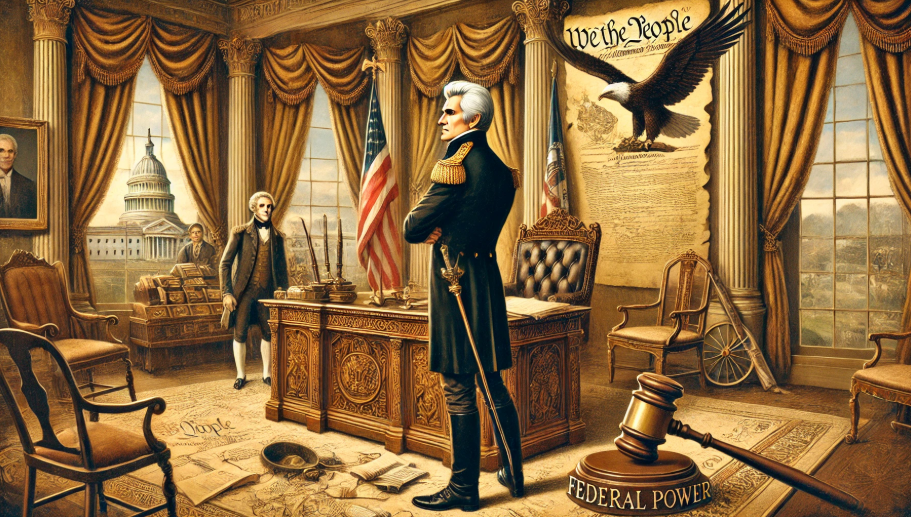Jackson and Federal Power
Introduction
Andrew Jackson, the seventh President of the United States, is a pivotal figure in American history, renowned for his robust stance on federal power and his impact on the nation’s political landscape. Serving from 1829 to 1837, Jackson’s presidency marked a significant shift in the relationship between the federal government and the states, as well as between the government and its citizens. This comprehensive guide explores Jackson’s career, his ascent to the presidency, and the key policies and events that defined his tenure, providing valuable insights for AP US Government students.
Andrew Jackson’s Career
Jackson as a War Hero
Andrew Jackson’s reputation as a formidable military leader was cemented during the War of 1812. Known as the “Hero of the Battle of New Orleans,” Jackson led his troops to a decisive victory against a superior British force on January 8, 1815. Despite the war having officially ended with the Treaty of Ghent, the Battle of New Orleans showcased Jackson’s strategic prowess and earned him national acclaim. This victory not only bolstered American morale but also solidified Jackson’s image as a dedicated and courageous leader, paving the way for his future political aspirations.
Andrew Jackson’s Role in US Expansion
Beyond his military achievements, Jackson played a crucial role in the expansion of the United States, particularly in the southern regions. His efforts in acquiring vast tracts of land facilitated the growth of cotton production, leading to an economic boom in agriculture and manufacturing. This expansion fostered confidence among Americans and fueled an unprecedented period of growth and prosperity in these industries. Jackson’s policies and actions during this period were instrumental in shaping the economic landscape of the burgeoning nation.
The Election of 1824
The presidential election of 1824 was one of the most contentious and controversial in American history. With no candidate securing a majority in the Electoral College, the decision fell to the House of Representatives. The main contenders were Andrew Jackson, John Quincy Adams, and William H. Crawford. Despite Jackson winning both the popular and electoral votes in most states, he was outmaneuvered by his opponents in the House, leading to John Quincy Adams being elected as the sixth President. This election highlighted the intricacies of the American electoral system and set the stage for Jackson’s subsequent political maneuvers.
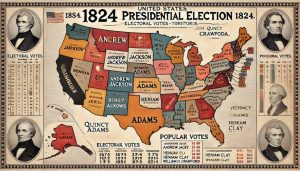
Democracy and Citizenship under Adams
John Quincy Adams’ presidency introduced several policies that inadvertently set the stage for Jackson’s rise to power. Notably, during Adams’ term, many states eased voting requirements, expanding suffrage and enlarging the voting population. This democratization of voting rights meant that political candidates needed to appeal to a broader segment of the populace. Jackson capitalized on this shift by positioning himself as the champion of the “common man,” contrasting sharply with Adams’ image as an elitist. This dynamic significantly influenced the political landscape and voter behavior leading up to the Election of 1828.
The Election of 1828
The Election of 1828 was a pivotal moment in American politics, marking a significant shift towards greater democracy and the emergence of the Democratic Party as a dominant force. The main contenders were Andrew Jackson, representing the Democratic Party, and John Quincy Adams, the incumbent President and candidate of the National Republican Party. The campaign was marred by personal attacks and mudslinging, with Jackson and his supporters accusing Adams of corruption and elitism, while Adams and his supporters portrayed Jackson as an uneducated demagogue.
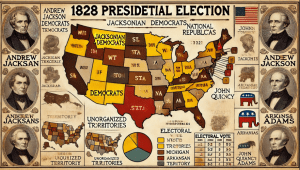
Jackson’s victory in this election was decisive, securing 178 electoral votes to Adams’ 83 and a substantial popular vote margin. This triumph was not only a personal victory for Jackson but also signaled the rise of a new era in American politics characterized by increased participation and political activism from ordinary citizens.
Jackson’s Presidency
Andrew Jackson’s presidency was marked by significant policies and events that reshaped federal power and American society. Below are key aspects of his tenure:
Spoils System
Upon assuming office, Jackson sought to reform the federal government, which he perceived as corrupt and dominated by a wealthy elite. To achieve this, he implemented the Spoils System, replacing existing bureaucrats with his political supporters, regardless of their qualifications or experience. This approach, based on the principle of “to the victor belongs the spoils,” aimed to democratize government positions but also led to widespread patronage and corruption. Critics argued that the Spoils System undermined the efficiency and integrity of the federal bureaucracy.
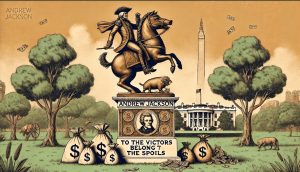
Tariffs of Abominations
The Tariff of 1828, known as the “Tariff of Abominations” by its opponents, was designed to protect American industry by imposing high taxes on imported goods. While it benefited Northern manufacturers, it was detrimental to Southern economies, particularly plantation owners who relied on cheap imported goods. The tariff exacerbated sectional tensions between the North and South, contributing to the growing divide over economic policies and states’ rights.
The Nullification Crisis
The Nullification Crisis was a major confrontation between the federal government and the state of South Carolina. In response to the Tariffs of Abominations, South Carolina declared the tariffs null and void within the state, asserting the right to reject federal laws deemed unconstitutional. Jackson vehemently opposed this stance, issuing the Force Bill which authorized the use of military force to enforce federal laws. To defuse the crisis, Jackson negotiated the Compromise Tariff of 1833, which gradually reduced tariff rates. This crisis highlighted the ongoing struggle over states’ rights and federal authority.
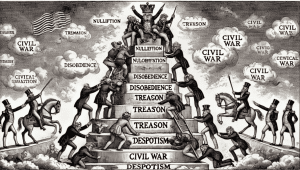
The National Bank Battle
Andrew Jackson’s opposition to the Second Bank of the United States was a defining aspect of his presidency. Viewing the Bank as a symbol of elite privilege and corruption, Jackson vetoed its recharter and subsequently ordered the removal of federal deposits, transferring them to state-chartered “pet banks.” This move was part of his broader effort to dismantle what he saw as an undemocratic institution. However, the destruction of the National Bank led to economic instability and contributed to the Panic of 1837, a severe financial crisis that plagued the nation.
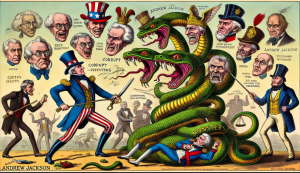
The Indian Removal Act
One of the most controversial policies of Jackson’s presidency was the Indian Removal Act of 1830. This legislation authorized the forced relocation of Native American tribes from their ancestral lands in the southeastern United States to designated territories west of the Mississippi River. The implementation of this act led to the tragic Trail of Tears, during which thousands of Native Americans died from disease, starvation, and exposure. The Indian Removal Act exemplified Jackson’s commitment to westward expansion and his disregard for the rights and lives of Native Americans.
The Second Party System
The political landscape during and after Jackson’s presidency saw the emergence of the Second Party System, characterized by the rivalry between the Democratic Party and the Whig Party. This system marked a significant shift in American politics, emphasizing broader voter participation and more defined political ideologies.
Table: The Second Party System
| Aspect | Democratic Party | Whig Party |
|---|---|---|
| Leader | Andrew Jackson | Henry Clay |
| Philosophy | Limited federal government, states’ rights | Strong federal government, economic modernization |
| Key Policies | Opposition to the National Bank, support for westward expansion | Support for the National Bank, internal improvements, protectionist tariffs |
| Base of Support | Farmers, working-class, South and West | Business interests, Northern states, wealthier citizens |
| Political Ideology | Populist, championing the “common man” | Protective of business, pro-development |
| Stance on Slavery | Varied, but generally supportive in Southern states | Divided, some factions opposed slavery |
Presidency of Martin Van Buren
Following Andrew Jackson, Martin Van Buren became the eighth President of the United States. His presidency was largely defined by the Panic of 1837, an economic crisis that resulted from the collapse of state banks and the repercussions of Jackson’s financial policies, including the dismantling of the National Bank. Van Buren’s adherence to hard money policies, which emphasized specie (gold and silver) over paper currency, failed to alleviate the economic downturn, leading to widespread unemployment, bank failures, and a prolonged recession.
Additionally, Van Buren dealt with international disputes, particularly with Canada over border issues, and navigated the complexities of Texas annexation. Although Texas had been ready for annexation during Jackson’s presidency, Van Buren opposed it due to concerns over maintaining the balance between free and slave states, fearing that admitting Texas as a slave state would tip this balance unfavorably.
Conclusion
Andrew Jackson’s tenure as President fundamentally transformed the nature of federal power and American politics. His assertive policies, such as the Spoils System, opposition to the National Bank, and the Indian Removal Act, exemplified his belief in a strong executive branch and his commitment to expanding the power of the “common man.” However, these actions also sparked significant controversy, leading to heightened sectional tensions and laying the groundwork for future political realignments.
Jackson’s legacy is a complex tapestry of democratic expansion and authoritarian policies, reflecting the contradictions inherent in the early 19th-century American republic. Understanding his impact provides invaluable insights into the evolution of federal authority, the dynamics of political parties, and the enduring struggles over states’ rights and individual liberties that continue to shape the United States.
You got this!
Frequently Asked Questions (FAQs)
1. Is Andrew Jackson considered a controversial president?
Yes, Andrew Jackson is often regarded as one of the most controversial presidents in American history. While he is celebrated for his role in expanding democracy and championing the “common man,” his policies, particularly the Indian Removal Act and the dismantling of the National Bank, have been widely criticized for their negative impacts on Native Americans and the economy.
2. How did the Spoils System affect the federal government?
The Spoils System significantly altered the federal government by replacing long-standing bureaucrats with political supporters. While this increased democratic participation by allowing more citizens to hold government positions, it also led to widespread patronage and corruption, undermining the efficiency and integrity of government institutions.
3. What was the Nullification Crisis and its significance?
The Nullification Crisis was a confrontation between the federal government and the state of South Carolina over the Tariffs of Abominations. South Carolina declared the tariffs null and void within the state, asserting the right to reject federal laws. Jackson’s firm stance against nullification reinforced federal authority and set a precedent for the supremacy of federal law over state laws.
4. Why did Andrew Jackson oppose the National Bank?
Andrew Jackson opposed the National Bank of the United States because he viewed it as a tool of the elite that concentrated economic power and fostered corruption. He believed that the Bank favored wealthy interests over the common people and thus vetoed its recharter, ultimately leading to its dissolution.
5. What were the long-term effects of the Indian Removal Act?
The Indian Removal Act had devastating long-term effects on Native American tribes, leading to the forced relocation known as the Trail of Tears. Thousands of Native Americans died during the relocation, and their ancestral lands were permanently lost, significantly disrupting their societies and cultures.

